Prometheus Blu-ray Movie
HomePrometheus Blu-ray Movie 
Blu-ray + DVD + UV Digital Copy20th Century Fox | 2012 | 124 min | Rated R | Oct 09, 2012
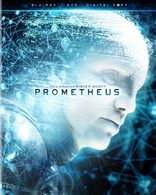
Movie rating
7.6 | / 10 |
Blu-ray rating
| Users | 4.3 | |
| Reviewer | 4.0 | |
| Overall | 4.3 |
Overview
Prometheus (2012)
The discovery of a clue to mankind's origins on Earth leads a team of explorers on a distant planet. They soon find out that they are not alone.
Starring: Noomi Rapace, Michael Fassbender, Charlize Theron, Idris Elba, Guy PearceDirector: Ridley Scott
| Action | Uncertain |
| Sci-Fi | Uncertain |
| Adventure | Uncertain |
| Thriller | Uncertain |
| Horror | Uncertain |
| Mystery | Uncertain |
Specifications
Video
Video codec: MPEG-4 AVC
Video resolution: 1080p
Aspect ratio: 2.40:1
Original aspect ratio: 2.39:1
Audio
English: DTS-HD Master Audio 7.1 (48kHz, 24-bit)
Spanish: Dolby Digital 5.1 (448 kbps)
French: Dolby Digital 5.1 (448 kbps)
Portuguese: Dolby Digital 5.1
Russian: DTS 5.1
Hindi: Dolby Digital 5.1
Tamil: Dolby Digital 5.1
Telugu: Dolby Digital 5.1
Ukrainian: Dolby Digital 5.1
Subtitles
English SDH, Portuguese, Spanish, Danish, Dutch, Estonian, Finnish, Latvian, Lithuanian, Norwegian, Russian, Swedish, Ukrainian
Discs
50GB Blu-ray Disc
Two-disc set (1 BD, 1 DVD)
UV digital copy
DVD copy
Packaging
Slipcover in original pressing
Playback
Region free
Review
Rating summary
| Movie | 4.0 | |
| Video | 5.0 | |
| Audio | 5.0 | |
| Extras | 3.0 | |
| Overall | 4.0 |
Prometheus Blu-ray Movie Review
Ridley Scott's flawed-but-magnificent return to sci-fi.
Reviewed by Casey Broadwater October 8, 2012In response to mankind's three most pressing questions—Where do we come from? What is our purpose? What happens to us when we die?—the
empirically minded suggest that we probably arose through abiogenesis out of a primordial ooze, that we exist to propagate our genetic code, and that
death simply returns our atoms to be endlessly recycled. The faithful, meanwhile, take comfort in a supernatural creator who has a plan for their lives,
culminating in an eternal heavenly reward. But what if neither camp is quite right? What if we were planted here, not by a god, but by a race
of corporal beings sufficiently technologically advanced to traverse the universe, seeding the cosmos with life of their own design?
This is no new idea, but it first gained cultural traction with the 1968 publication of Erick von Däniken's bestseller, Chariots of the Gods? Unsolved
Mysteries of the Past, a work of staggering psuedoscience and blatant anthropological chicanery. If completely bonkers and without any actual
evidence, the book still makes for an imaginative flight of fancy, and its key, "ancient astronauts" concept serves well as the basis for
Prometheus, director Ridley Scott's magnificent-but-flawed return to the sci-fi genre. Despite what you may have heard, the film is a
prequel to Scott's 1979 classic, Alien, although not necessarily a direct one. It's better to think of Prometheus as a semi-
distant relative, twice or thrice-removed. The two movies aren't immediately narratively linked, but they share much of the same DNA.
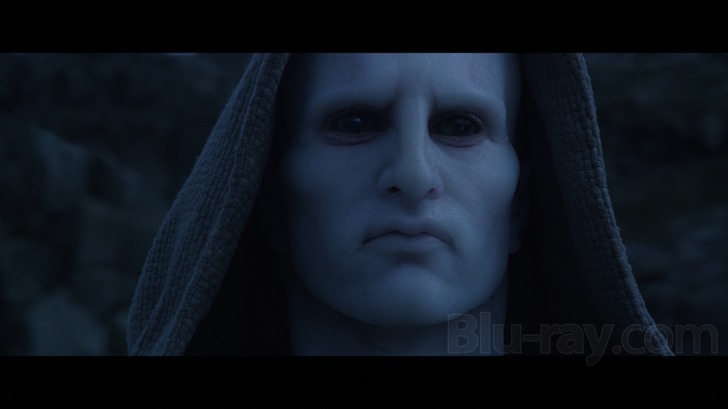
The sacrificial Engineer...
And Prometheus is all about DNA. The pre-title sequence takes us over a barren, lifeless landscape, and up to the top of a turbid glacial waterfall, where an alien protohuman—who looks like a buff, living marble reproduction of Michelangelo's David—stands by the shore, holding a cup of black goo. This is an "Engineer," as they'll later come to be called, and he's here to seed what we can presume to be Earth. He downs the viscous caviar-like substance in one gulp, and immediately his cellular structure begins to break down, causing his skin to rupture, his bones to snap grotesquely, and his body to fall into the water, where it dissolves, spreading genetic material downstream. Et voilà! Life. Eons later, in 2089, we cut to a pair of anthropologist lovers—the believer Elizabeth Shaw (Noomi Rapace) and the atheistic Charlie Holloway (Logan Marshall-Green)—as they find a 30,000-year-old cave painting on the Isle of Skye, depicting an Engineer-ish-looking figure pointing to a cluster of stars, an image that's been found in numerous archeological sites around the globe. Shaw believes it's "an invitation," and soon enough they're aboard the spacecraft Prometheus—funded by the supposedly dead industrialist Peter Weyland (Guy Pierce)—zipping toward the distant moon LV-223, hoping to find answers to humanity's deepest existential questions.
Unlike the Nostromo, Alien's dingy blue-collar mining craft, Prometheus—named after the mythological fire-stealer—is a state-of-the-art research vessel, carrying scientists from pertinent fields, including spectacled biologist Millburn (Raff Spall) and punk geologist Fifield (Sean Harris), along with a substantial crew of ancillary characters. The ship is captained by former military man Janek (Idris Elba), but the real leader of the expedition is Meredith Vickers (Charlize Theron), a stone-cold Weyland Corp. employee who makes it clear to everyone—Shaw and Holloway especially— that they report to her. Also on board is David (Michael Fassbender), an 8th generation android who's obsessed with Laurence of Arabia—he even dyes his hair to look like Peter O'Toole—and ironically becomes the very soul of the film, a grown-up Pinocchio who can never become a real boy. Not to demean the rest of the cast, who are generally decent-to-excellent, but Theron and Fassbender are the two acting powerhouses here, the former all icy secrecy and the latter effete and guarded—think a more refined C3PO crossed with Hal from 2001: A Space Odyssey.
In a way, Prometheus is a more pop, "genre"-oriented version of 2001, both concerned with evolution, artificial intelligence, and the notion that something out there gave the fire of human consciousness its first spark. Where Kubrick's film is a slow-burning intellectual exercise, Prometheus becomes a tension-ratcheting affair where the big ideas are couched in stylish big-budget sci-fi/horror action. When the ship lands on LV-223, which is not the moon from Alien, the crew quickly—too quickly to believe actually—spots and enters an enormous pyramid complex with reniform subterranean tunnels and a chamber that houses a monolithic human head and dozens of cylinders filled with that DNA-altering black goop. Nearby are the piled up bodies of several long-dead "engineers," who were obviously trying to escape something but didn't make it. Without getting into spoilers, it's safe to assume to that one or more team members become "infected," and you can also expect to see some aggressive lifeforms that have never before appeared in the Alien franchise, although they share the phallic/yonic, H.R. Giger-inspired qualities of the facehuggers and xenomorphs of yore. There are grotesque mutations, frantic firefights—one involving an actual flamethrower—and even an emergency alien fetus c-section, the film's most white-knuckle, squirm-inducing scene.
Does the original xenomorph monster show up? Well, sort of. Let's just say it has a fan-appeasing cameo. Written by Jon Spaihts and Lost's Damon Lindelof, Prometheus expands the universe of the series and unravels a few mysteries from the first film—yes, the "space jockey" in that pilot's chair was an "engineer"—but it also raises a host of other questions that it doesn't have time to answer. (Why do the engineers suddenly want us dead? Why leave us a star map guiding us to what's essentially a biological weapons depot? If the engineers created us, who created them?) With a sequel already in the works, I don't consider the lingering ambiguities a problem—and I love the post-viewing discussions that naturally arise because of them—but Prometheus does have other shortcomings. There are small potential plot holes, and a few scenes that feel forced—inserted for narrative convenience or just to ramp up the action—but the most noticeable issue is that characters sometimes simply don't act in believably human ways. They contradict earlier established behaviors. They make choices only a soon-to-be-slaughtered teenager in a slasher movie would make. They don't express nearly enough awe at the fact that they're not just on another world, but making discoveries that dramatically alter humanity's assumptions about its own origins.
Prometheus probably could've used another script revision to tighten everything up, but the pacing flows well—even when some of the events don't exactly make sense in retrospect—and there's no doubt that the film is an experience, the kind of grand-scale, high-concept science fiction that's unfortunately rare. (Although, between Looper and Cloud Atlas this year, sci-fi seems to be making a comeback.) I don't really get the small but rabid cult of haters that's sprung up to deride the film, but I blame the internet hype machine, which skews expectations impossibly. If you're anticipating the be-all-end-all Alien movie, with mind-melting twists and non-stop horror, then yes, Prometheus might be a bit of a let-down. But this prequel really is its own entity and deserves to be seen and evaluated on its own terms. Personally, I think it's a terrific reboot of a franchise that had grown ridiculous long before the dopey Alien vs. Predator movies. Ridley Scott directs the hell out of this thing, the scope is immense—check out those real, predominately non-CGI sets—and call me a heretic, but damn if Michael Fassbender doesn't make a better android that Ian Holm or Lance Henriksen ever did. Onto the sequel, I say, and if Scott isn't going to do it—he's only listed as producer, and he'll probably be busy revisiting the world of Blade Runner—I nominate David Fincher, whose Alien 3 got bungled by the studio, and who definitely deserves another shot at the series. Anyone second that motion?
Prometheus Blu-ray Movie, Video Quality 
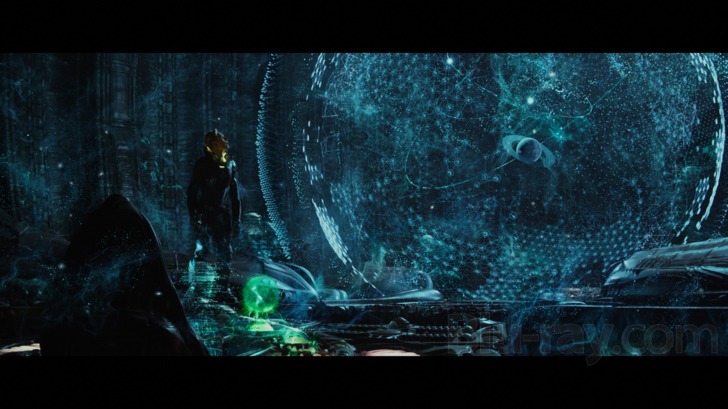
Gorgeous. And that's about all you really need to know. But for the sake of completeness, let's get into what makes Prometheus' 1080p/AVC- encoded Blu-ray transfer so stunning. Using Red Epic digital cameras mounted to 3ality Technica Atom 3D rigs, the film was shot almost entirely on Pinewood Studio's famed—and enormous—007 lot, allowing Ridley Scott and cinematographer Dariusz Wolski complete control over the lighting of the magnificently detailed sets. The combination of a great camera system, high-quality Zeiss lenses, and precise manipulation of the direction and degree of light makes for an image that's often terrifically sharp and nearly noiseless at times. Camera noise does spike a bit during the darkest scenes, but it has a granular quality that looks almost filmic up close, with no digital harshness or chroma artifacts, and it isn't really noticeable from a normal viewing distance. It should also go without saying that there are no compression issues or encode errors on this top-tier release; even scenes where you might expect to see some banding or splotchiness—flashlights cutting through darkness, volumetric clouds of dust rising into the air, fine color gradients—hold up under pixel-peeping scrutiny. The level of clarity is exemplary for a live-action film. Fine detail is ever-present in the textures of the actors' faces, the fabric of their clothing, and the intricacies of the props and set design. The film's distinct color palette is handled with ease too. The inky depths of the pyramid, the yellow LED lights inside the explorers' helmets, the cool fluorescence inside Prometheus, the spatters of blood, the skin tones—everything has a satisfying density and presence.
Prometheus Blu-ray Movie, Audio Quality 
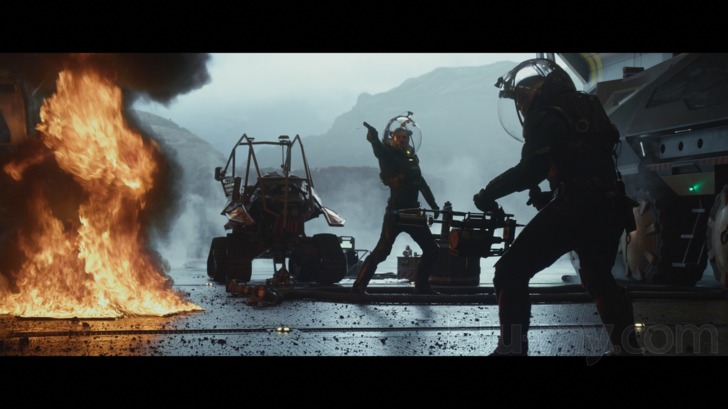
Turn off the lights, crank up your receiver, and settle in—Prometheus's lossless DTS-HD Master Audio 7.1 surround track is one to savor, particularly if you've got a home theater setup capable of bringing the aural goods. This mix just doesn't quit; from start to finish it delivers room- quaking dynamics, pristine clarity, and polished, realistic, puts-you-right-in-the-middle-of-the-action sound design. From the opening scene on the barren planet Earth we get deep sub-woofer engagement, the lapping, crashing, and bubbling of a massive waterfall, and the thunderous rumble of an alien ship overhead. The sense of all-surrounding immersion is near-constant from here forward. Bleeps and bloops and the hush of processed air aboard the Prometheus. Sirens wailing in the rears. Dripping rain. Convincing cavernous reverb. The whipping of a monster's tendrils. Debris from an explosion rocketing through the soundscape. Silica dust clinking furiously as a storm blows across LV-223. Fifield's mapping "pups" as they zoom off through underground corridors. There's not a scene where the audio isn't lushly and thoughtfully arranged. Just take the actors' voices, which—besides being well-balanced and easily understood—always reflect the acoustics of their surroundings, flatter aboard the ship, slightly muffled inside their helmets, echoing and wet inside the pyramid. All this is backed up by Marc Streitenfeld's enormous-sounding orchestral score, which alternates between quiet uneasiness and sheer bombast.
Prometheus Blu-ray Movie, Special Features and Extras 
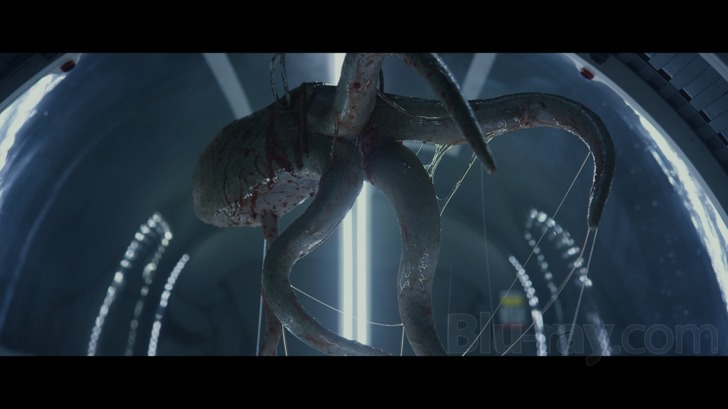
Before we dig into what's included here, I just want to make sure you're aware that this version is bare-boned compared to the Prometheus 3D Blu-ray: 4-Disc Collector's Edition,
which comes with an exclusive bonus disc featuring a brilliant three-and-half-hour documentary by Charles de Lauzirika. The 3D set contains the 2D disc
as well—for those who don't have 3D-capable TVs—so for a few bucks more, it's definitely the Prometheus release to get.
Audio Commentaries
- Director/Producer Ridley Scott: If you're like me, you could listen to Scott talk about his work for hours, and he thankfully obliges us here with a detailed commentary that takes us through the nuances of production, from the decision to revisit the world of Alien to the casting process to the joys and challenges of shooting in 3D. Great stuff, even if Scott sometimes lapses into describing—in great detail—exactly what's happening on screen.
- Writer John Spaihts and Writer/Executive Producer Damon Lindelof: I have the unsubstantiated feeling that Spaihts resents Lindelof's involvement—the latter was brought in to rework the former's script—and so I wasn't surprised that this is one of those patchwork commentary tracks where the two participants are recorded separately and their remarks edited together later. Still, there's so much to learn here about the creation of the story, the teasing out of the film's themes, and the development of the characters. Well worth a listen.
- Arrival of the Engineers (2:45): "The engineers touch down on Prehistoric Earth for a sacred ritual devoted to the seeding of intelligent life. Whereas the theatrical version of the scene is devoted to the lone sacrificial engineer, this early cut features several of his comrades, including the elder engineer. The ceremony was filmed with dialogue but unsatisfied with the result, Ridley Scott removed the recorded dialogue entirely."
- T'is the Season (1:07): "Janek and Vickers test each other a bit on Christmas morning in this extended scene." With optional commentary by Scalia and Stammers.
- Our First Alien (00:51): "Biologist Milburn makes an exciting discovery in the engineer pyramid which could very well represent the first stage in the evolution of a far more dangerous organism. David seems pleased."
- Skin (00:51): "Milburn and Fifield make an odd find (which may strike a chord with Alien fans) in the pyramid. Could it be a clue as to what killed off the engineers?"
- We're Not Alone Anymore (1:32): "Following the team's return from the engineer pyramid, Shaw shares a toast with the Prometheus crew, celebrating their historic discovery. Holloway does not share her enthusiasm."
- Strange Bedfellows (3:11): "In this original version of the scene, the tension between Shaw and Holloway is significantly more argumentative, resulting in a less-sympathetic depiction of Holloway and undermining the impact of his eventual fate. This scene was reshot months later with the version that now appears in the film, taking a softer, more romantic approach while establishing that Shaw is infertile, better setting up the horrific revelation that is to come."
- Holloway Hungover (1:35): "An extended version of the post-coital scene in Shaw and Holloway's quarters, allowing the couple a few more tender moments together before unknowingly beginning what will be their final journey together."
- David's Objective (00:31): "This brief transitional scene increases the tension between David and Vickers as she suits up to intercept the infected Holloway and defend the ship from possible contagion."
- Janek Fills Vickers In (3:43): "Following Holloway's demise, a shaken Vickers is visited in her quarters by Janek, who attempts to console her. He then tells her about his military history, adding a tale that seems to parallel what the engineers might have been up to."
- A King Has His Reign (3:56): "An extended version of this uneasy reunion between Weyland and Vickers, this scene includes additional dialogue. This moment, along with 'Fifield Attacks' and most of the connecting scenes between them, had their order significantly restructured deep into the editing process for greater story clarity."
- Fifield Attacks (2:14): "Originally intending to show Fifield's mutation in a more advanced stage, the visual effects team at Weta planned on using on-set footage of actor Sean Harris and his stunt double Will Willoughby in full prosthetic make-up as reference and later replace them with a completely digital creation. In the end, Ridley Scott opted to 'keep it real' and use Harris' live performance instead of this alternate CG version of the scene. Yet another alternate cut of this scene in which Weyland, Shaw and team were to leave for the engineer pyramid in the midst of Fifield's attack (glimpsed briefly in the film's trailers) was abandoned early on."
- The Engineer Speaks (4:23): "Awakened after two-thousand years of hypersleep, the Engineer is greeted by Weyland and the others. David's study of ancient languages comes in handy as he serves as Weyland's interpreter."
- Final Battle (5:51): "Shaw returns to Vickers' escape vehicle to regroup, only to be tracked there by the furious engineer. The final confrontation between Shaw and the engineer was originally intended to be a slower burn leading up to a longer, more physical clash between the two, as scene here."
- Paradise (5:20): "This extended scene reveals new information about the engineer homeworld as well as some alternate dialogue between Shaw and David. Note that one of Ridley Scott's original titles for the film was Paradise and it was even maintained as a cover title for secrecy during production."
- Quiet Eye: Elizabeth Shaw: A video call Shaw made to Weyland to introduce herself and explain her findings.
- Happy Birthday, David: An introduction to the 8th generation android, David, who explains what he thinks about and what makes him sad.
- Prometheus Transmission: A collection of pre-mission "interviews" with the crew of Prometheus. The crew of the ship, that is, not the film.
- TED Conference, 2023: In the best promo, a young Peter Weyland—Guy Pierce, sans old man makeup—gives a darkly inspirational TED Talk where he proclaims that "we are the gods now" and "if you'll indulge me, I'd like to change the world."
Prometheus Blu-ray Movie, Overall Score and Recommendation 
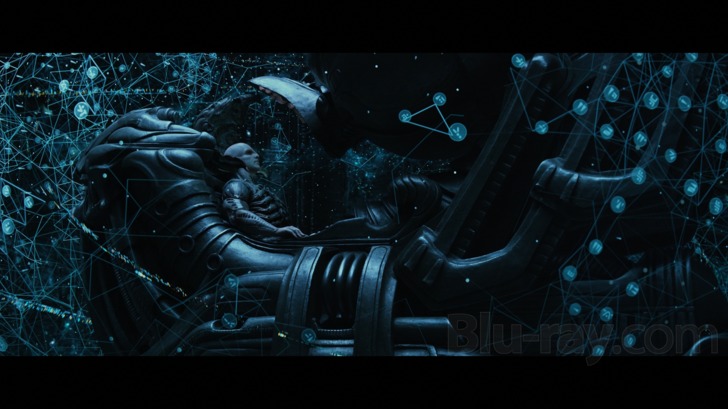
So much of a film's reception comes down to the expectations of its audience, and Prometheus was perhaps unfairly saddled with the high hopes of Alien fans, who were looking forward to the be-all-end-all in interstellar terror. What they got instead was a pop-philosophical rumination on human origins, faith, and science, packaged inside a tense sci-fi plot that borrows the Alien universe but isn't necessarily beholden to the storytelling staples of the franchise. After so many sequels of diminishing quality—and let's not even talk about the Alien Vs. Predator disasters— this prequel-of-sorts is exactly the kind of change that the series needed. Are there problems here? Absolutely, most relating to narrative convenience, potential plot holes, and a few too many characters. But don't listen to the haters; Prometheus is much better than the sum of its flaws. In a time when epic, high-concept science fiction films are few and much too far between, it stands as a monolithic achievement in scope and style. Those still disappointed by the "lack of answers" should be patient—a sequel is already in the works. Until then, we can all bide our time with this fantastic Blu- ray release—which features a stellar audio/video presentation—although I'd recommend avoiding the 2D-only edition and picking up the Prometheus 3D Blu-ray: 4-Disc Collector's Edition, which includes the 2D disc plus an exclusive bonus disc with a fantastic three-and-a-half hour making-of documentary. It's well worth a few extra bucks. Highly recommended!
Other editions
Prometheus: Other Editions

Prometheus
Movie Only Edition
2012

Prometheus 3D
4-Disc Collector's Edition
2012

Prometheus 3D
4-Disc Collector's Edition | Artbook
2012

Prometheus
2012

Prometheus
2012

Prometheus
2012

Prometheus
2012

Prometheus
2012

Prometheus 3D
3-Disc Collector's Edition
2012

Prometheus
w/ 4 Exclusive Mondo Cards + Alien: Covenant Movie Cash
2012

Prometheus 4K
2012

Prometheus Exclusive Pre-Order Empty Case
2012

Prometheus
2012

Prometheus 3D
4-Disc Collector's Edition
2012
Similar titles
Similar titles you might also like

Alien 4K
40th Anniversary Edition
1979

Alien: Resurrection
1997

Alien³
1992

Aliens 4K
Ultimate Collector's Edition
1986

Lost in Space 4K
Limited Edition
1998

Alien: Covenant 4K
2017

Oblivion 4K
2013

Riddick 4K
2013

Red Planet 4K
Limited Edition
2000

Pandorum
2009

Alien vs. Predator
2004

The Predator
2018

Space Battleship Yamato
2010

After Earth
2013

Pitch Black 4K
Special Edition
2000

Aliens vs. Predator: Requiem
Extreme Unrated Set
2007

Outlander
2008

Serenity 4K
2005

Star Trek 4K
2009

Doom 4K
Unrated Extended Edition
2005